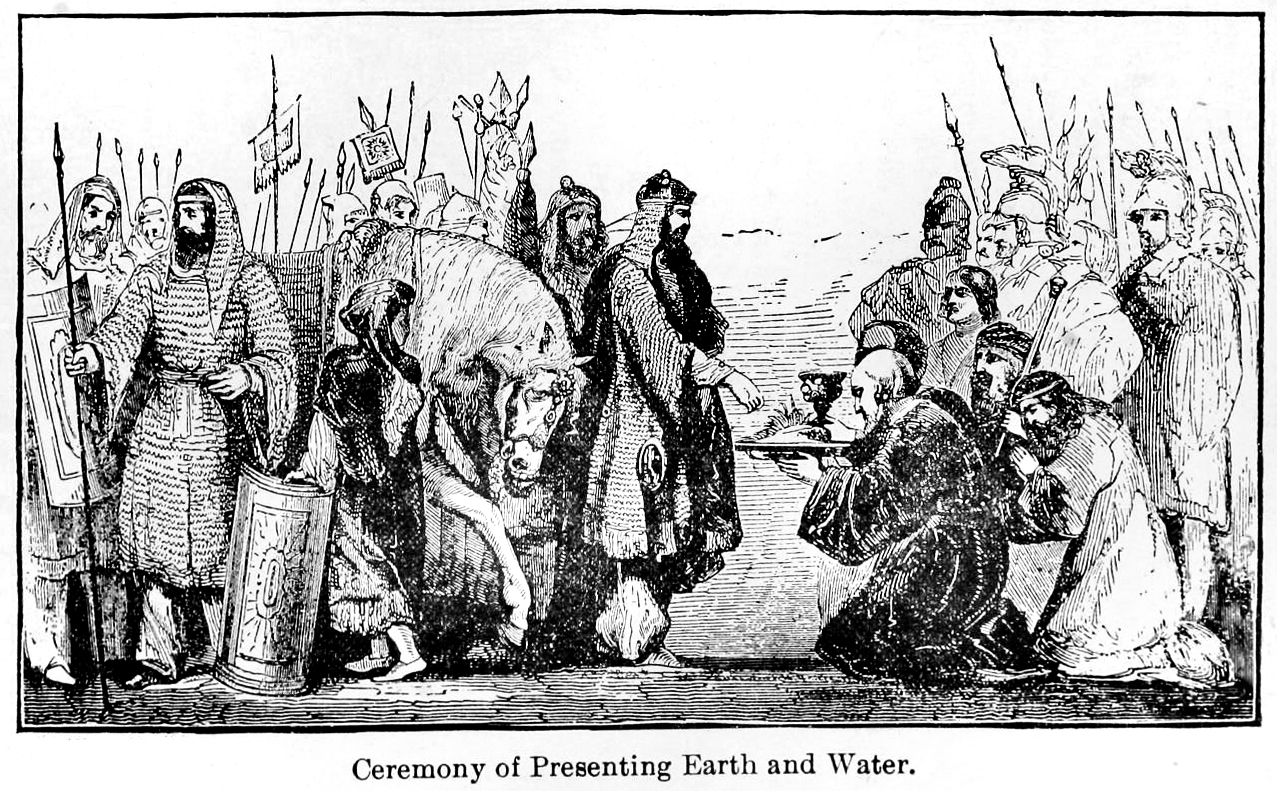|
487 BC
__NOTOC__ 487 BC was a year of the pre-Julian Roman calendar. At the time, it was known as the Year of the Consulship of Sicinius and Aquillius (or, less frequently, year 267 ''Ab urbe condita''). The denomination 487 BC for this year has been used since the early medieval period, when the Anno Domini calendar era became the prevalent method in Europe for naming years. Events By place Greece * The island of Aegina and the city of Athens go to war. The island has earned the enmity of Athens by earlier submitting to the Persians. The Spartan King, Leotychidas, tries unsuccessfully to arrange a truce in the war. * The Athenian Archonship becomes elective by lot from all the citizens, an important milestone in the move towards radical Athenian democracy. There are nine archons and a secretary. Three of the archons have special functions: the basileus, or sovereign; the polemarch (originally a military commander); and the archon eponymous (chief magistrate), who gave his name t ... [...More Info...] [...Related Items...] OR: [Wikipedia] [Google] [Baidu] |
Roman Calendar
The Roman calendar was the calendar used by the Roman Kingdom and Roman Republic. Although the term is primarily used for Rome's pre-Julian calendars, it is often used inclusively of the Julian calendar established by Julius Caesar in 46 BC. According to most Roman accounts, #Romulus, their original calendar was established by their Roman legend, legendary list of kings of Rome, first king Romulus. It consisted of ten months, beginning in spring with March and leaving winter as an unassigned span of days before the next year. These months each had 30 or 31 days and ran for 38 nundinal cycles, each forming a kind of eight-day weeknine days inclusive counting, counted inclusively in the Roman mannerand ending with religious rituals and a Roman commerce, public market. This fixed calendar bore traces of its origin as an observational calendar, observational lunar calendar, lunar one. In particular, the most important days of each monthits kalends, nones (calendar), nones, a ... [...More Info...] [...Related Items...] OR: [Wikipedia] [Google] [Baidu] |
Cleisthenes
Cleisthenes ( ; ), or Clisthenes (), was an ancient Athenian lawgiver credited with reforming the constitution of ancient Athens and setting it on a democratic footing in 508 BC. For these accomplishments, historians refer to him as "the father of Athenian democracy". He was a member of the aristocratic Alcmaeonid clan. He was the younger son of Megacles and Agariste making him the maternal grandson of the tyrant Cleisthenes of Sicyon. He was also credited with increasing the power of the Athenian citizens' assembly and for reducing the power of the nobility over Athenian politics. In 510 BC, Spartan troops helped the Athenians overthrow the tyrant Hippias, son of Peisistratus. Cleomenes I, king of Sparta, put in place a pro-Spartan oligarchy headed by Isagoras. However, Cleisthenes, with the support of the middle class and aided by democrats, took over. Cleomenes intervened in 508 and 506 BC, but could not stop Cleisthenes and his Athenian supporters. Through Cleisthen ... [...More Info...] [...Related Items...] OR: [Wikipedia] [Google] [Baidu] |
Philosophy
Philosophy ('love of wisdom' in Ancient Greek) is a systematic study of general and fundamental questions concerning topics like existence, reason, knowledge, Value (ethics and social sciences), value, mind, and language. It is a rational and critical inquiry that reflects on its methods and assumptions. Historically, many of the individual sciences, such as physics and psychology, formed part of philosophy. However, they are considered separate academic disciplines in the modern sense of the term. Influential traditions in the history of philosophy include Western philosophy, Western, Islamic philosophy, Arabic–Persian, Indian philosophy, Indian, and Chinese philosophy. Western philosophy originated in Ancient Greece and covers a wide area of philosophical subfields. A central topic in Arabic–Persian philosophy is the relation between reason and revelation. Indian philosophy combines the Spirituality, spiritual problem of how to reach Enlightenment in Buddhism, enlighten ... [...More Info...] [...Related Items...] OR: [Wikipedia] [Google] [Baidu] |
Ancient Greece
Ancient Greece () was a northeastern Mediterranean civilization, existing from the Greek Dark Ages of the 12th–9th centuries BC to the end of classical antiquity (), that comprised a loose collection of culturally and linguistically related city-states and communities. Prior to the Roman period, most of these regions were officially unified only once under the Kingdom of Macedon from 338 to 323 BC. In Western history, the era of classical antiquity was immediately followed by the Early Middle Ages and the Byzantine period. Three centuries after the decline of Mycenaean Greece during the Bronze Age collapse, Greek urban poleis began to form in the 8th century BC, ushering in the Archaic period and the colonization of the Mediterranean Basin. This was followed by the age of Classical Greece, from the Greco-Persian Wars to the death of Alexander the Great in 323 BC, and which included the Golden Age of Athens and the Peloponnesian War. The u ... [...More Info...] [...Related Items...] OR: [Wikipedia] [Google] [Baidu] |
Gorgias
Gorgias ( ; ; – ) was an ancient Greek sophist, pre-Socratic philosopher, and rhetorician who was a native of Leontinoi in Sicily. Several doxographers report that he was a pupil of Empedocles, although he would only have been a few years younger. W. K. C. Guthrie writes that "Like other Sophists, he was an itinerant that practiced in various cities and giving public exhibitions of his skill at the great pan-Hellenic centers of Olympia and Delphi, and charged fees for his instruction and performances. A special feature of his displays was to ask miscellaneous questions from the audience and give impromptu replies." W. K. C. Guthrie, ''The Sophists'' (New York: Cambridge University Press, 1971), p. 270. He has been called "Gorgias the Nihilist", although the degree to which this epithet adequately describes his philosophy is controversial.Rosenkrantz, G. (2002). The Possibility of Metaphysics: Substance, Identity, and Time*. Philosophy and Phenomenological Research, 64(3), ... [...More Info...] [...Related Items...] OR: [Wikipedia] [Google] [Baidu] |
Amaniastabarqa
Amaniastabarqa (also Amaniastabarqo) was a Kushite king of Meroë who ruled in the late Sixth or early Fifth centuries BC, c. 510–487 BCE.Stele of King Amaniastabarqa Museum of Fine Arts, Boston. Reign He is the presumed successor of Karkamani, according to the sequence of the at where he was buried (no. 2). The pyramid was excavated by a |
Kingdom Of Kush
The Kingdom of Kush (; Egyptian language, Egyptian: 𓎡𓄿𓈙𓈉 ''kꜣš'', Akkadian language, Assyrian: ''Kûsi'', in LXX Χους or Αἰθιοπία; ''Ecōš''; ''Kūš''), also known as the Kushite Empire, or simply Kush, was an ancient kingdom in Nubia, centered along the Nile Valley in what is now northern Sudan and southern Egypt. The region of Nubia was an early cradle of civilization, producing several complex societies that engaged in trade and industry. The city-state of Kerma emerged as the dominant political force between 2450 and 1450 BC, controlling the Nile Valley between the first and fourth Cataracts of the Nile, cataracts, an area as large as Egypt. The Egyptians were the first to identify Kerma as "Kush" probably from the indigenous ethnonym "Kasu", over the next several centuries the two civilizations engaged in intermittent warfare, trade, and cultural exchange. Much of Nubia came under Egyptian rule during the New Kingdom of Egypt, New Kingdom pe ... [...More Info...] [...Related Items...] OR: [Wikipedia] [Google] [Baidu] |
Siaspiqa
Siaspiqa (also Si'aspiqo) was a ruler of the Kushite kingdom of Meroë reigning for close to twenty years in the first half of the 5th century BC. Very little is known of Siaspiqa's activities beyond the construction of his pyramid at Nuri, now known as Nuri 4. The pyramid and its chapel have yielded several inscribed stelas bearing his name as well as numerous artefacts suggesting a once rich burial. Nothing is known for certain on the relations between Siaspiqa and his predecessor Amaniastabarqa and successor Nasakhma. Equally uncertain is the identity of his consort, with queen Pi'ankhqewqa buried in the nearby Nuri 29 conjectured for that role. Identity and chronology Siaspiqa is known under two or less likely three names: his nomen Siaspiqa and one or two throne names Segerehtawyre, which means " Ra is the pacifier of the Two Lands", and possibly Semenkheretnetjer. This last name is contested as it could instead be the name of a ritual connected with erecting the pyr ... [...More Info...] [...Related Items...] OR: [Wikipedia] [Google] [Baidu] |
Roman Conquest Of The Hernici
Roman or Romans most often refers to: *Rome, the capital city of Italy *Ancient Rome, Roman civilization from 8th century BC to 5th century AD *Roman people, the people of Roman civilization *Epistle to the Romans, shortened to Romans, a letter written by Paul, found in the New Testament of the Christian Bible * Ar-Rum (), the 30th sura of the Quran. Roman or Romans may also refer to: Arts and entertainment Music * Romans (band), a Japanese pop group * ''Roman'' (album), by Sound Horizon, 2006 * ''Roman'' (EP), by Teen Top, 2011 *" Roman (My Dear Boy)", a 2004 single by Morning Musume Film and television *Film Roman, an American animation studio * ''Roman'' (film), a 2006 American suspense-horror film * ''Romans'' (2013 film), an Indian Malayalam comedy film * ''Romans'' (2017 film), a British drama film * ''The Romans'' (''Doctor Who''), a serial in British TV series People * Roman (given name), a given name, including a list of people and fictional characters * Roman (surnam ... [...More Info...] [...Related Items...] OR: [Wikipedia] [Google] [Baidu] |
Roman Republic
The Roman Republic ( ) was the era of Ancient Rome, classical Roman civilisation beginning with Overthrow of the Roman monarchy, the overthrow of the Roman Kingdom (traditionally dated to 509 BC) and ending in 27 BC with the establishment of the Roman Empire following the War of Actium. During this period, Rome's control expanded from the city's immediate surroundings to hegemony over the entire Mediterranean Sea, Mediterranean world. Roman society at the time was primarily a cultural mix of Latins (Italic tribe), Latin and Etruscan civilization, Etruscan societies, as well as of Sabine, Oscan, and Greek cultural elements, which is especially visible in the Ancient Roman religion and List of Roman deities, its pantheon. Its political organisation developed at around the same time as direct democracy in Ancient Greece, with collective and annual magistracies, overseen by Roman Senate, a senate. There were annual elections, but the republican system was an elective olig ... [...More Info...] [...Related Items...] OR: [Wikipedia] [Google] [Baidu] |
Ostracism
Ostracism (, ''ostrakismos'') was an Athenian democratic procedure in which any citizen could be expelled from the city-state of Athens for ten years. While some instances clearly expressed popular anger at the citizen, ostracism was often used preemptively. It was used as a way of neutralizing someone thought to be a threat to the state or a potential tyrant, though in many cases popular opinion often informed the expulsion. The word " ostracism" continues to be used for various forms of shunning. Procedure The term "ostracism" is derived from the pottery shards that were used as voting tokens, called '' ostraka'' (singular: ''ostrakon'' ) in Greek. Broken pottery, abundant and virtually free, served as a kind of scrap paper (in contrast to papyrus, which was imported from Egypt as a high-quality writing surface, and too costly to be disposable). Each year the Athenians were asked in the assembly whether they wished to hold an ostracism. The question was put in the sixt ... [...More Info...] [...Related Items...] OR: [Wikipedia] [Google] [Baidu] |







